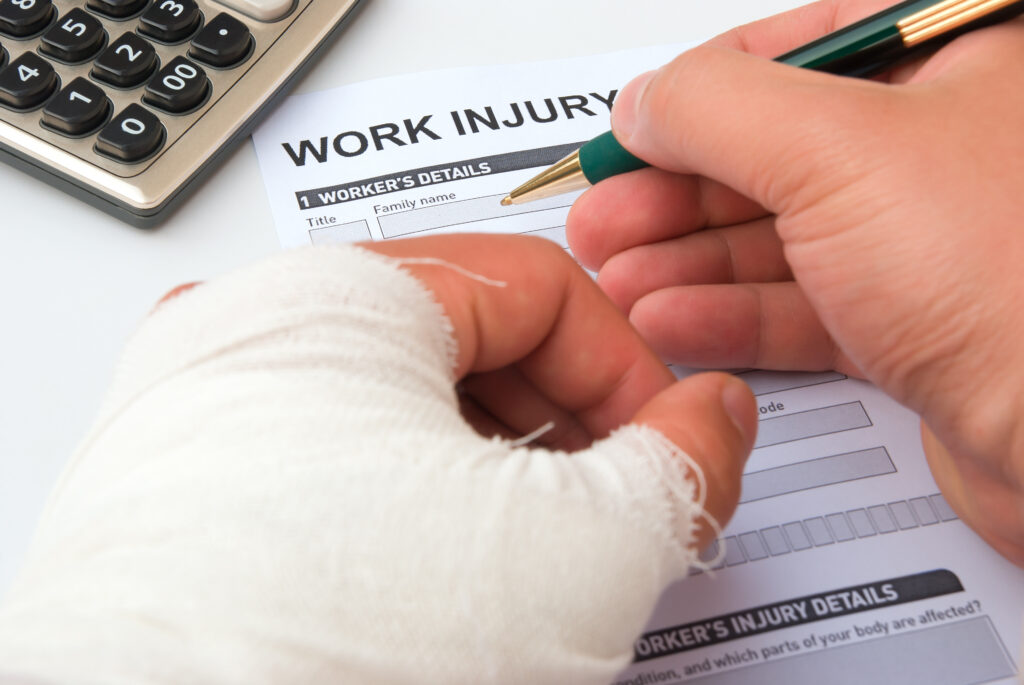Pennsylvania Workers’ Compensation laws were designed to protect workers in the event of an accident or injury at work or otherwise related to the employment, without regard to fault. This means that for the vast majority of on the job work accidents in Pennsylvania, the worker will be able to make a workers’ compensation claim, even if the accident was the worker’s own fault (i.e., due to the worker’s own carelessness).
Example one: A worker trips on stairs walking to the office, falls down the stairs and sustains serious injuries. The fall was caused by the worker’s own carelessness, rushing down the stairs wearing high heels. Even though the accident was the worker’s own fault, Pennsylvania workers’ compensation laws would probably allow her to make a claim, assuming all other requirements are met. Related: Pennsylvania Workers’ Compensation – Do You Qualify for Workers’ Compensation Benefits?
Example two: A worker on a construction site is injured while walking on a low scaffold. He is not paying attention to where he is stepping and walks off a plank and suffers an ankle injury. Like the example above, this worker would also be eligible for workers’ compensation benefits. Again, even though the accident was his fault, he is still probably eligible to make the claim.
Beyond Pennsylvania Workers’ Compensation
It is important to note that in many work accident cases in Pennsylvania, parties other than the employer may be liable. Such claims would be in addition to, or on top of, a workers’ compensation claim. For instance, in a fall accident case at work, a vendor or contractor may be liable. Work accident cases must be reviewed carefully for these types of additional claims.
Pennsylvania Workers’ Compensation – Exceptions to Eligibility When a Worker is at Fault
Under the Pennsylvania Workers’ Compensation Law, there are several exceptions to eligibility for workers’ compensation benefits. These exceptions tend to be rare, but are worth noting because they do occur:
- intentional/self-inflicted injury,
- violation of law,
- violation of a positive order,
- illegal use of drugs, or
- intoxication.
PA Workers’ Compensation – Horsing Around at Work
- the accident/injury was caused by violating the employer’s order/command,
- the worker knew of the order/command, and
- the order/command related to an activity not connected with the worker’s usual work duties.
A 2011 Pennsylvania Commonwealth Court case illustrates this exception. In Habib v. WCAB, the Pennsylvania Commonwealth Court found in favor of the employer and denied workers’ compensation benefits to the employee. In that case, the worker was a paving company employee. While on a job, the crew found a bowling ball, and several employees tried to break the bowling ball with a sledge hammer. The supervisor told the workers to stop. However, the worker at issue suffered major eye injuries when a shard of the ball flew into his eye.
Because there was evidence that the worker’s supervisor told the workers to stop and because taking a sledge hammer to a bowling ball was obviously not connected to paving duties, the worker’s benefits were denied.
Related:
- Pennsylvania Workers’ Compensation Law – The Basics (Part B)
- Pennsylvania Workers’ Compensation Law – The Basics (Part A)
- Construction Accidents in PA & NJ – General Contractor Liability
Pennsylvania Workers’ Compensation Accident Lawyer
The Philadelphia law firm of Laffey Bucci D’Andrea Reich & Ryan represents workers who are injured on the job. Our work accident lawyers specialize in handling negligence cases against third parties and may handle workers’ compensation cases. Depending on the facts of a given work accident case, the firm may refer the workers’ compensation case to another law firm. Please call the firm for a free consultation. Call (215) 399-9255.
Jeff Laffey is passionate about workers’ rights and accident safety. Learn about his 2012 workplace safety presentation to union members in Philadelphia.
Jeff’s law firm proudly represents union and nonunion workers, such as:
- carpenters,
- plumbers,
- electricians,
- steel workers,
- iron workers, and
- laborers.
Disclaimer: The lawyers at Laffey Bucci D’Andrea Reich & Ryan provide legal advice to individuals after accepting their case. No attorney-client relationship is created by this website. Nothing on this site is intended to provide legal advice. Because every case is unique, discussion of prior outcomes and settlements in past cases is no guarantee of a similar outcome in current or future cases.

